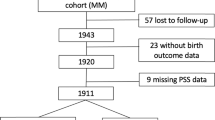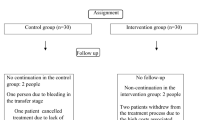Abstract
Miscarriage is the greatest complication of pregnancy, and 70–80% of early miscarriages are mostly due to chromosomal abnormalities in the embryo. There is no evidence that stress is a direct cause of miscarriage. Despite these findings, in a national US survey on the causes of miscarriage, many Americans mistakenly attributed miscarriage to the mental state or behavior of the women. We conducted a survey to assess public attitudes and perceptions regarding the cause and prevalence of miscarriage in Japan. We sent out a questionnaire consisting of 17 questions. The 5000 recipients consisted of men and women (1:1 ratio) aged 18–69 who resided in Aichi Prefecture. A total of 1257 recipients (25%) responded to the questionnaire and 1219 valid respondents (24%) were included in the analyses. Of these, 62% considered a genetic abnormality of the fetus as the cause of miscarriage. Participants who were female, highly educated, married and healthy gave significantly more correct responses. On the other hand, the majority wrongly assumed that a stressful event (65%) and long-standing stress (75%) to be causes of miscarriage. Participants who had no history of miscarriage as well as males answered significantly more incorrectly. Sixty-five percent of respondents thought that miscarriage occurred less than 15% of all pregnancies. Among respondents who had experienced miscarriage personally, 53 and 36% felt guilty and lonely, respectively. Many respondents blamed the woman for the miscarriage either in terms of her behavior or mental stress and considered the frequency of miscarriage to be lower than it actually is.
This is a preview of subscription content, access via your institution
Access options
Subscribe to this journal
Receive 12 print issues and online access
$259.00 per year
only $21.58 per issue
Buy this article
- Purchase on Springer Link
- Instant access to full article PDF
Prices may be subject to local taxes which are calculated during checkout



Similar content being viewed by others
References
Sugiura-Ogasawara M, Suzuki S, Ozaki Y, Katano K, Suzumori N, Kitaori T. Frequency of recurrent spontaneous abortion and its influence on further marital relationship and illness: the Okazaki Cohort Study in Japan. J Obstet Gynaecol Res. 2013;39:126–31.
Ogasawara M, Aoki K, Okada S, Suzumori K. Embryonic karyotype of abortuses in relation to the number of previous miscarriages. Fertil Steril. 2000;73:300–4.
Azmanov DN, Milachich TV, Zaharieva BM, Michailova GI, Dimitrova VG, Karagiozova ZH, et al. Profile of chromosomal aberrations in different gestational age spontaneous abortions detected by comparative genomic hybridization. Eur J Obstet Gynecol Reprod Biol. 2007;131:127–31.
European Society for Human Reproduction and Embryology (ESHRE) early pregnancy guideline development group. Recurrent Pregnancy Loss. 2017; 24–5.
Stephenson MD, Awartani KA, Robinson WP. Cytogenetic analysis of miscarriages from couples with recurrent miscarriage: a case-control study. Hum Reprod. 2002;17:446–51.
Sugiura-Ogasawara M, Ozaki Y, Katano K, Suzumori N, Kitaori T, Mizutani E. Abnormal embryonic karyotype is the most frequent cause of recurrent miscarriage. Hum Reprod. 2012;27:2297–303.
Klebanoff MA, Shiono PH, Rhoads GG. Outcomes of pregnancy in a national sample of resident physicians. N. Engl J Med. 1990;323:1040–5.
Stray-Pedersen B, Stray-Pedersen S. Etiologic factors and subsequent reproductive performance in 195 couples with a prior history of habitual abortion. Am J Obstet Gynecol. 1984;148:140–6.
Katano K, Suzuki S, Ozaki Y, Suzumori N, Kitaori T, Sugiura-Ogasawara M. Peripheral natural killer cell activity as a predictor of recurrent pregnancy loss: a large cohort study. Fertil Steril. 2013;100:1629–34.
Bardos J, Hercz D, Friedenthal J, Missmer SA, Williams Z. A national survey on public perceptions of miscarriage. Obstet Gynecol. 2015;125:1313–20.
Sugiura-Ogasawara M, Ozaki Y, Kaneko S, Kitaori T, Kumagai K. Japanese single women have limited knowledge of age-related reproductive time limits. Int J Gynaecol Obstet. 2010;109:75–6.
Bujang MA, Ghani PA, Zolkepali NA, Selvarajah S, Haniff J. A comparison between convenience sampling versus systematic sampling in getting the true parameter in a population: explore from a clinical database: the Audit Diabetes Control Management (ADCM) registry in 2009. Int Conf Stat Sci Bus Eng 2009;2012:1–5.
Bujang MA, Sa’at N, TMITAB Sidik, Joo LC. Sample size guidelines for logistic regression from observational studies with large population: emphasis on the accuracy between statistics and parameters based on real life clinical data. Malays J Med Sci. 2018;25:122–30.
Kolte AM, Olsen LR, Mikkelsen EM, Christiansen OB, Nielsen HS. Depression and emotional stress is highly prevalent among women with recurrent pregnancy loss. Hum Reprod. 2015;30:777–82.
Sugiura-Ogasawara M, Furukawa TA, Nakano Y, Hori S, Aoki K, Kitamura T. Depression as a potential causal factor in subsequent miscarriage in recurrent spontaneous aborters. Hum Reprod. 2002;17:2580–4.
Nelson DB, Grisso JA, Joffe MM, Brensinger C, Shaw L, Datner E. Does stress influence early pregnancy loss? Ann Epidemiol. 2003;13:223–9.
Plana-Ripoll O, Parner E, Olsen J, Li J. Severe stress following bereavement during pregnancy and risk of pregnancy loss: results from a population-based cohort study. J Epidemiol Community Health. 2016;70:424–9.
Stocker LJ, Macklon NS, Cheong YC, Bewley SJ. Influence of shift work on early reproductive outcomes: a systematic review and meta-analysis. Obstet Gynecol. 2014;124:99–110.
Yang HJ, Kao FY, Chou YJ, Huang N, Chang KY, Chien LY. Do nurses have worse pregnancy outcomes than non-nurses? Birth. 2014;41:262–7.
Lee JW, Jones PS, Mineyama Y, Zhang XE. Cultural differences in responses to a Likert scale. Res Nurs Health. 2002;25:295–306.
Farren J, Mitchell-Jones N, Verbakel JY, Timmerman D, Jalmbrant M, Bourne T. The psychological impact of early pregnancy loss. Hum Reprod Update. 2018;24:731–49.
Neugebauer R, Kline J, Shrout P, Skodol A, O’Connor P, Geller PA, et al. Major depressive disorder in the 6 months after miscarriage. JAMA. 1997;277:383–8.
Lok IH, Neugebauer R. Psychological morbidity following miscarriage. Best Pr Res Clin Obstet Gynaecol. 2007;21:229–47.
Aoki K, Furukawa T, Ogasawara M, Hori S, Kitamura T. Psychosocial factors in recurrent miscarriages. Acta Obstet Gynecol Scand. 1998;77:572–3.
Kagami M, Maruyama T, Koizumi T, Miyazaki K, Nishikawa-Uchida S, Oda H, et al. Psychological adjustment and psychosocial stress among Japanese couples with a history of recurrent pregnancy loss. Hum Reprod. 2012;27:787–94.
United Nations Development Programme—General information. https://www.undp.org/. https://doi.org/10.1016/j.whi.2015.04.005. Retrieved Nov 21, 2019. Accessed 11 Mar 2019.
National Female President Analysis—Teikoku Data Bank. https://www.tdb.co.jp/report/watching/press/pdf/p151004.pdf. Retrieved Nov 21, 2019. Accessed 26 Sept 2019.
Survey on science and technology related activities—Cabinet Office. https://www8.cao.go.jp/cstp/stsonota/katudocyosa/h27/innovation8.pdf. Retrieved Nov 21, 2019. Accessed 26 Sept 2019.
Nikcević AV, Kuczmierczyk AR, Nicolaides KH. The influence of medical and psychological interventions on women’s distress after miscarriage. J Psychosom Res. 2007;63:283–90.
Acknowledgements
We are grateful to Aichi Prefectural Government Department of Health Public Welfare Children and Families Division for its help in viewing the Basic Resident Register in order to extract the subjects for the survey.
Funding
This study was supported by a Grant-in-aid for Nagoya City University.
Author information
Authors and Affiliations
Contributions
MSO designed the present survey, analyzed the data, and CB wrote the first draft of the manuscript. TE was responsible for analyzing the data. MSO, KA, and YM were responsible for preparing a questionnaire and supervision of the study. CB, SI, TS, and TK were responsible for data acquisition. All authors interpreted the data, contributed to the writing of the manuscript and revised it critically for important intellectual content.
Corresponding author
Ethics declarations
Conflict of interest
The authors declare that they have no conflict of interest.
Additional information
Publisher’s note Springer Nature remains neutral with regard to jurisdictional claims in published maps and institutional affiliations.
Rights and permissions
About this article
Cite this article
Banno, C., Sugiura-Ogasawara, M., Ebara, T. et al. Attitude and perceptions toward miscarriage: a survey of a general population in Japan. J Hum Genet 65, 155–164 (2020). https://doi.org/10.1038/s10038-019-0694-1
Received:
Revised:
Accepted:
Published:
Issue Date:
DOI: https://doi.org/10.1038/s10038-019-0694-1
This article is cited by
-
Navigating miscarriage in Jordan: understanding emotional responses and coping strategies
BMC Pregnancy and Childbirth (2023)
-
The Relationship Between Heavy Metals and Missed Abortion: Using Mediation of Serum Hormones
Biological Trace Element Research (2023)
-
Miscarriage Risk Factors for Pregnant Women: A Cohort Study in Eastern Algeria’s Population
The Journal of Obstetrics and Gynecology of India (2022)



